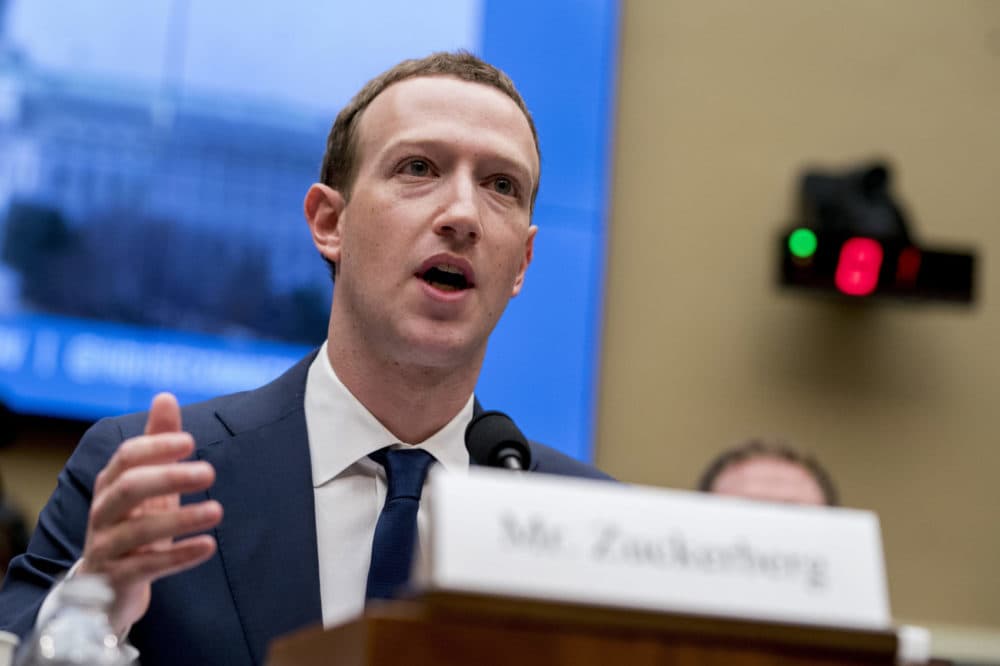Advertisement
Break Up Facebook? Debate Builds Around Companies Some Call Modern-Day Monopolies
Resume
Facebook co-founder Chris Hughes wrote in a recent New York Times op-ed that at one time in history, the social media giant he helped Mark Zuckerberg build would have been broken up — and should be now.
"Mark's influence is staggering, far beyond that of anyone else in the private sector or in government," Hughes writes. "He controls three core communications platforms — Facebook, Instagram and WhatsApp — that billions of people use every day. Facebook's board works more like an advisory committee than an overseer, because Mark controls around 60 percent of voting shares."
Some say breaking up Facebook would be un-American. But Hughes argues the nation's founders would have embraced it, and that Congress needs to create a new agency to ratchet up regulation of tech giants. His argument has gone viral, and wound up swaying economist Jared Bernstein, who served as former Vice President Biden's chief economic adviser in the Obama administration.
"I found the argument extremely muscular," Bernstein tells Here & Now's Robin Young. "There was so much written about the piece that I sort of felt like I'd read it without reading it, and then I sat down and read it. And when I did so, I was just blown away by just how strong and coherent and convincing ... that argument was."
Bernstein says he agrees Facebook has grown too powerful and ought to be broken up. But he says he questions whether doing so would actually solve the underlying problem.
"Imagine you had three or four or five smaller Facebooks, at least on paper, but the majority of the users all gravitated towards one — because these are all about networking, network effects," he says. "Well if you have everybody pretty much on one platform, even if you have 20 platforms, you still have the same problem. So while breaking up Facebook might be a partial solution, there's no way around this outside of some much more serious government regulation."
Interview Highlights
On monopoly busting originally occurring under the Sherman Antitrust Act because those large companies were forcing consumers to pay too much — but Facebook is free
"Today's monopolies are not necessarily manipulating us on prices — they're not jamming up the prices in the industries they concern. Of course, Facebook is free — but you could think of Amazon in the same light. I mean, people go there because prices are low, not because they're using their monopoly power to raise prices. So you have to look at something else, and that something else is market share, or market power, and the other distortions that that incurs.
"So in the case of Facebook, we have the well-known problems we had in the last election. But if you simply look at the share of the market that they dominate — or for that matter the share of the market that you can find specific companies dominating in everything from hardware to retail to pharmacies, to even mattresses and beer — you're going to find that same problem. It's not necessarily the kind of price distortions that our original antitrust laws were targeting."
On the idea that government should step in when there's a monopoly, and Hughes' argument that that idea has come to be seen as un-American
"Chris is exactly right about that, and it's a critical point. We got here because the notion of laissez faire economics — essentially leaving corporations alone to grow as big and powerful as they want — was sold as integral to an efficient economy, that the damage done from regulating the size or power of corporations would be far worse to the economy's performance, efficiency, output, than keeping them down to size. And ... that's new thinking.
"If you go back to earlier periods in American economic history, it wasn't something that Democrats and Republicans fought about. There was a very common view ... dating back to Adam Smith that this kind of dominant corporate power had to be checked, because to do so actually was positive for the economy. It would actually promote innovation, productivity, the economic dynamism where small firms that had some special attribute were able to to grow in an environment, that they weren't crushed by a dominant firm within the industry. This was well understood by economists. But we forgot about that because in fact, the forces who benefit from corporate concentration basically started to dominate the argument in the 1970s by essentially buying up the intellectual architecture of those arguments and convincing everyone that taking action against corporate power was destructive, when in fact, the opposite can be the case."
On whether arguments like Hughes' have sparked fresh conversation among economists
"Very much so. The notion that we had to reform our antitrust laws to push back on corporate power is not something that you'd find sessions about in economic conferences going back 10 years. Now it's commonly understood to be an important market distortion that we have to address. I think the thing that economists had to get over was to stop looking solely at price, and look at other aspects: holding down wages, using their corporate power in political ways. We've had to broaden our scope, and I think it's much more broadly recognized. And I think one bit of evidence for this is not just from the economists, but if you look at the politics, I suspect that pretty much every one of those 20-plus people running for [president] on the Democratic side are going to have antitrust reform in their platforms, and that gets back precisely to the argument that Chris is making."
Alex Ashlock produced this interview and edited it for broadcast with Todd Mundt. Jack Mitchell adapted it for the web.
This segment aired on May 14, 2019.
